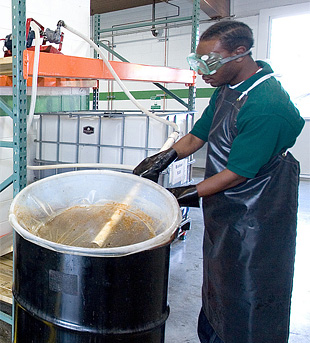May 1, 2012
Biodiesel Fuels Education in Alabama
As Alabama native Helen Keller once said, 'No one has the right to consume happiness without producing it.' The same can be said of energy.
Biodiesel is getting lots of mileage in Talladega, Alabama, and beyond, thanks to students at the Alabama Institute for Deaf and Blind (AIDB). Through AIDB's Project Green, students are producing biodiesel from waste vegetable oil, and they're spreading the word about alternative fuels in the process.
Project Green has received funding from a number of local, state, and federal sources, including $300,000 from the U.S. Department of Energy, which helped with production-site renovation, acquisition of biodiesel production equipment, and training. Fuel production began at the new site in April 2011. In less than a year, AIDB students produced 1,200 gallons of biodiesel. The fuel is used in lawn equipment, maintenance trucks, and other school vehicles. Eventually, officials expect production to reach the facility's full capacity of 55 gallons per day.
"As Alabama native Helen Keller once said, 'No one has the right to consume happiness without producing it,'" AIDB President Dr. Terry Graham said. "The same can be said of energy."
Project Green has substantial educational benefits. AIDB students participate in all aspects of the project, including identifying sources of waste vegetable oil and collecting it from restaurants, schools, businesses, and community drop-off sites. The biodiesel production process reinforces classroom concepts related to chemistry and math.
As part of AIDB work experience programs, students conduct facility tours to local school groups, give presentations to civic groups, and contribute to public awareness campaigns. The facility is open for tours to schools throughout Alabama. In advance of a tour by a visiting school, AIDB sends biodiesel-related instructional material aligned with the state's science and math curriculum for the appropriate grade level, and visiting students collect their own used cooking oil. At the onset of the tour, they empty their jugs into AIBD collection bins, and then observe the entire biodiesel production process from start to finish. Close to 400 students have toured the facility, and overall, the outreach components of Project Green have reached an estimated 10,000 people.
Alabama Clean Fuels Coalition helps with Project Green's outreach efforts and provides technical and research assistance.
